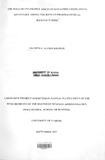| dc.description.abstract | Sustaining a competitive advantage is imperative for fums that are in dynamic
industries, which require effective strategic implementation to manage such changing
situations. The pharmaceutical company, which is a business that competes in the
knowledge economy for discovering and commercializing therapeutic agents, must
continually develop strategies to protect its intellectual capital and improve
performance. In order to sustain competitive advantage, pharmaceutical manufacturers
operate on the basis of their intangible assets.
The study sought to examine how, in the framework of resource-based view of the
firm, Kenyan pharmaceutical manufacturers use intangible assets to build
organizational capability to sustain competitive advantage and to determine the
challenges facing intangible assets' potential as sources of sustainable competitive
advantage among them. As a research setting, the study comprised of all
pharmaceutical manufacturers situated in Nairobi.
The respondents were asked to indicate, from a list of intangible assets, roles and
challenges, the extent of use, role played and challenges faced by their firms. The result
of the study showed majority of the respondents felt that intangible assets had a
,significant role in sustaining pharmaceutical manufacturers' competitive advantage.
Findings suggest a strong usage of intangible assets among the firms with over 50% of
the firms reporting a great extent use of company reputation, brand reputation,
customer service reputation, human resource management policies and patents. The
result also showed that intangible assets played significant role in enabling customers to
easily recognize firm's product as well as being source of revenue through franchising.
Proliferation of counterfeit products was cited by majority of the respondents as the
greatest challenge facing the pharmaceutical manufacturers with generics and weak
property law cited as significant threats. | en |

